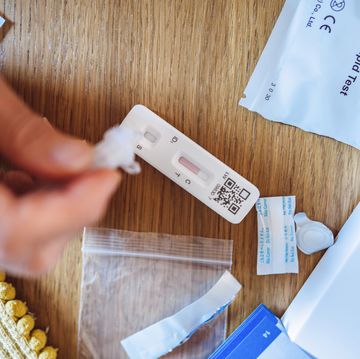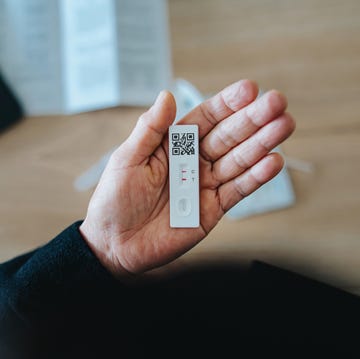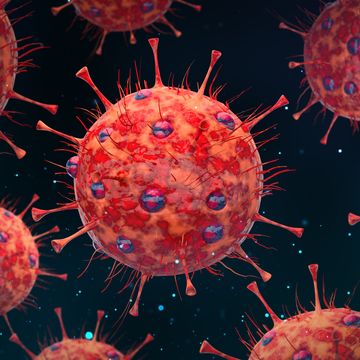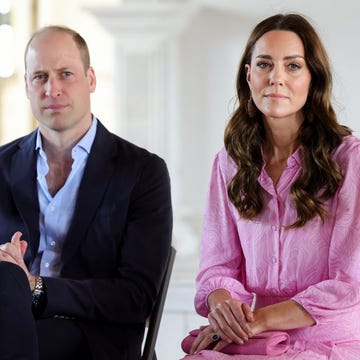No feeling can quite match the one of a good cry, and there’s science to back this up. Studies have shown that crying releases oxytocin and endogenous opioids, also known as endorphins. These feel-good chemicals help ease both physical and emotional pain. Not to mention, crying is essential for our eye health, by lubricating our eyes and helping to prevent infections. But sometimes, the tears just won’t fall, so you may ask yourself: why can’t I cry?
Turns out, your crying could be held up for a number of reasons. In general, the reasons why a person can’t cry are divided into medical or pharmacological or psychological categories, says James Kelly, M.D., ophthalmologist and founder of Kelly Vision Center in NYC. So, we’ve asked eye health experts to explain all the possible causes of your crying conundrum. Plus, when the issue could be something more serious and when to bring it up with your doctor.
Causes for why you can’t cry
Medical causes
Dry eye syndrome: From the medical standpoint, dry eye syndrome is very common, especially as we age, says Dr. Kelly. “In fact, it is one of the most common reasons patients seek out eye care professionals.”
Aging: Simple aging also causes the tear producing lacrimal, or tear, glands to function less effectively and can cause people over the age of 65 to have trouble producing tears, says Diane Hilal-Campo, M.D., board-certified ophthalmologist and founder of twenty/twenty beauty.
Diabetes: Both type 1 and type 2 diabetes are two of the most common causes of dry eye, says Dr. Hilal-Campo. Despite what type you have, “as many as 54% of people with diabetes can have trouble producing tears.”
Sjogren’s syndrome: Sjogren’s syndrome, an autoimmune disease whereby your body attacks healthy tissue, including the lacrimal gland that makes tears, can affect your ability to cry, says Dr. Hilal-Campo. Sjogren’s syndrome most often appears in women over 40, adds Dr. Kelly.
Other auto-immune disorders: Thyroid disorders, rheumatoid arthritis, as well as sarcoidosis, a condition that causes clusters of inflamed tissue called “granulomas” to form in different organs of the body, can all affect the ability to produce tears, says Dr. Hilal-Campo.
Excessive contact lens wear: Excessive contact lens wear is yet another situation where producing tears may be difficult, says Dr. Kelly.
Recent surgery: For a limited time after laser vision correction, or LASIK, dry eye may also occur, says Dr. Kelly.
Pharmacological causes
There are many medications, both prescription-based and over the counter, that cause dry eye and decreased tearing, says Dr. Kelly.
Some of these include allergy medications, like antihistamines and decongestants, high blood pressure medications, medications for depression or anxiety like SSRIs, hormone replacement therapy for menopause and hormonal birth control pills, and prescription oral anti-acne medications, explains Dr. Hilal-Campo.
Psychological causes
Mental health disorders can also affect the ability to cry, such as schizophrenia, which can cause emotional blunting and make it challenging to cry, or anhedonia associated with major depressive episodes, explains Dr. Hilal-Campo.
Often patients can have issues with melancholic depression that causes feelings of emotional numbness, or attachment disorder where patients cannot form an emotional attachment well enough to feel sadness and cry, adds Dr. Hilal-Campo.
Past trauma and cultural stigma, especially as it pertains to gender stereotypes, can also affect the ability to cry, adds Dr. Hilal-Campo. “Men are especially susceptible to this—they’re frequently told to ‘toughen up’ or ‘boys don’t cry’ from a very young age, which can make it challenging to cry.”
Treatment options for if you can’t cry
Treatment, of course, depends on the underlying reason, says Dr. Hilal-Campo. “If it’s from a mental health disorder, seeing a therapist or psychiatrist can be helpful.”
Typically, one of the first lines of treatment for dry eye is to use artificial tears on a regular basis, says Amy Fowler, M.D., oculofacial plastic surgeon and ophthalmologist at Duke Health. “Another treatment for dry eye is to trap as much naturally produced lubricating tear in the eye longer by placing ‘plugs’ in the tear drain system.” Other treatments of dry eye are aimed at increasing the other ingredients in our lubricating tear, namely, the mucus and oil levels, she adds.
Using lubricating eye drops for dry eye will help keep the eyes healthy, says Dr. Hilal-Campo, but seeing an eye doctor is necessary. “The eye doctor can prescribe medications like Tyrvaya, a nasal spray that stimulates the lacrimal gland to produce tears. Other medications eye doctors can prescribe are immune modulating eye drops like Restasis, Cequa, and Xiidra, which can control inflammation and, in this way, increase tear production,” says Dr. Hilal-Campo.
Why is crying important?
There is reason to be concerned if a person can’t cry, says Dr. Kelly. “Crying has both physical and emotional benefits. Crying maintains our eye health. It also serves as an emotional outlet.”
Generally speaking, crying is important, says Dr. Hilal-Campo. “Hydrating the surface of the eye is critical for ocular health.” The tears contain antibodies to help fight potential eye infections and bacteria, and they remove toxins and lubricate the eyes, she explains.
Crying is also good for your body, adds Dr. Hilal-Campo. “It releases oxytocin and endorphins while relieving stress hormones—all of this makes you feel better once you cry, even if you’re still sad.”
When to see a doctor if you can’t cry
If your eyes are uncomfortable from being unable to cry, red, irritated, burning, or feeling a gritty, foreign body sensation, see an eye health professional right away, suggests Dr. Hilal-Campo. “Patients with problems crying or producing tears need to be under the care of an eye doctor to make sure the eye structure is getting enough necessary lubrication.”
If you’re having trouble crying for mental health-related reasons, there’s no reason not to seek help sooner rather than later, says Dr. Hilal-Campo. “Crying is good for you.”
..Madeleine, Prevention’s assistant editor, has a history with health writing from her experience as an editorial assistant at WebMD, and from her personal research at university. She graduated from the University of Michigan with a degree in biopsychology, cognition, and neuroscience—and she helps strategize for success across Prevention’s social media platforms.
Raj Dasgupta, M.D. is an ABIM quadruple board-certified physician specializing in internal medicine, pulmonology, critical care, and sleep medicine. He practices at the University of Southern California, where he is an associate professor of clinical medicine, assistant program director of the Internal Medicine Residency Program, and the associate program director of the Sleep Medicine Fellowship. Dr. Dasgupta is an active clinical researcher and has been teaching around the world for more than 20 years.












